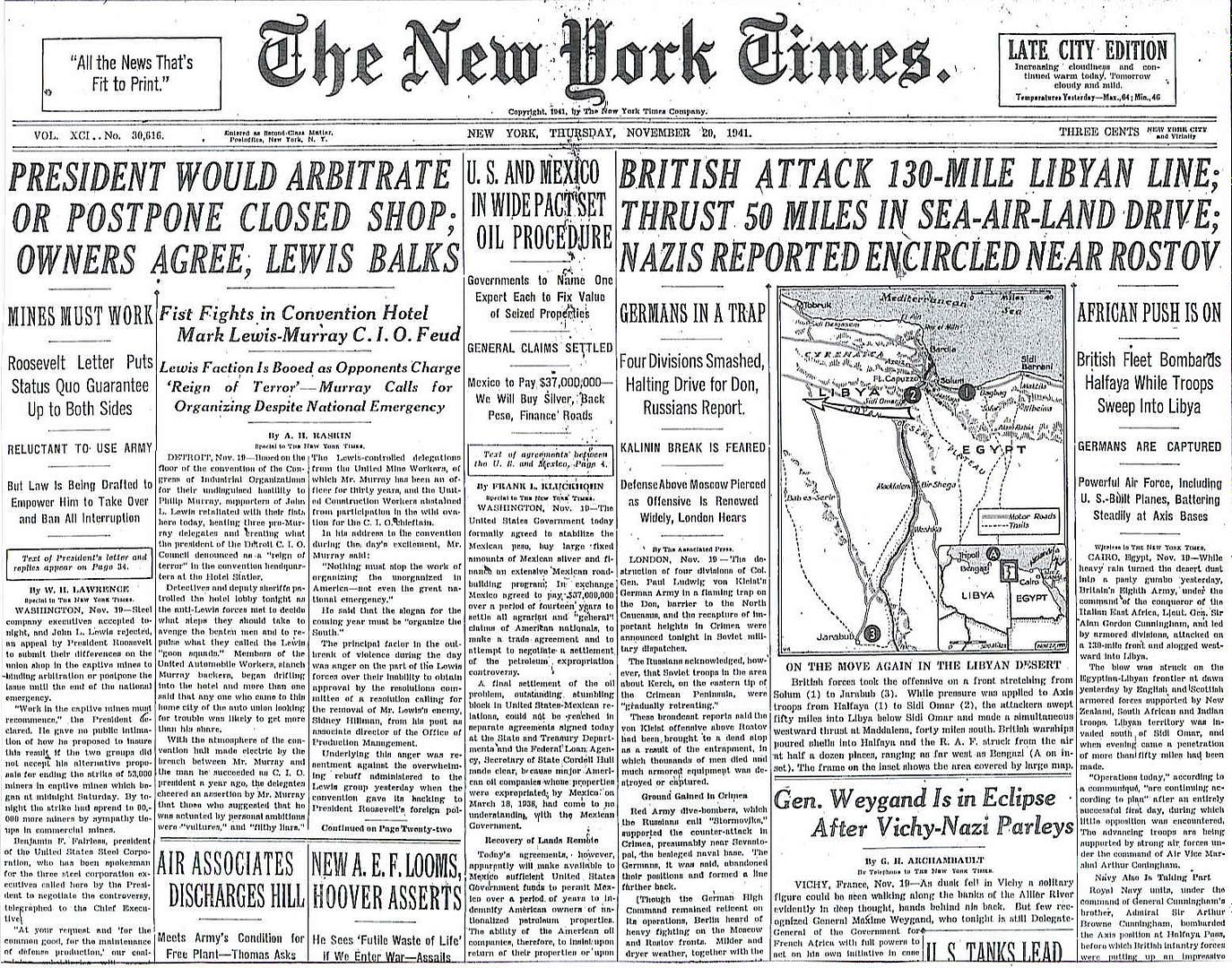
Posted on 11/20/2011 5:12:35 AM PST by Homer_J_Simpson

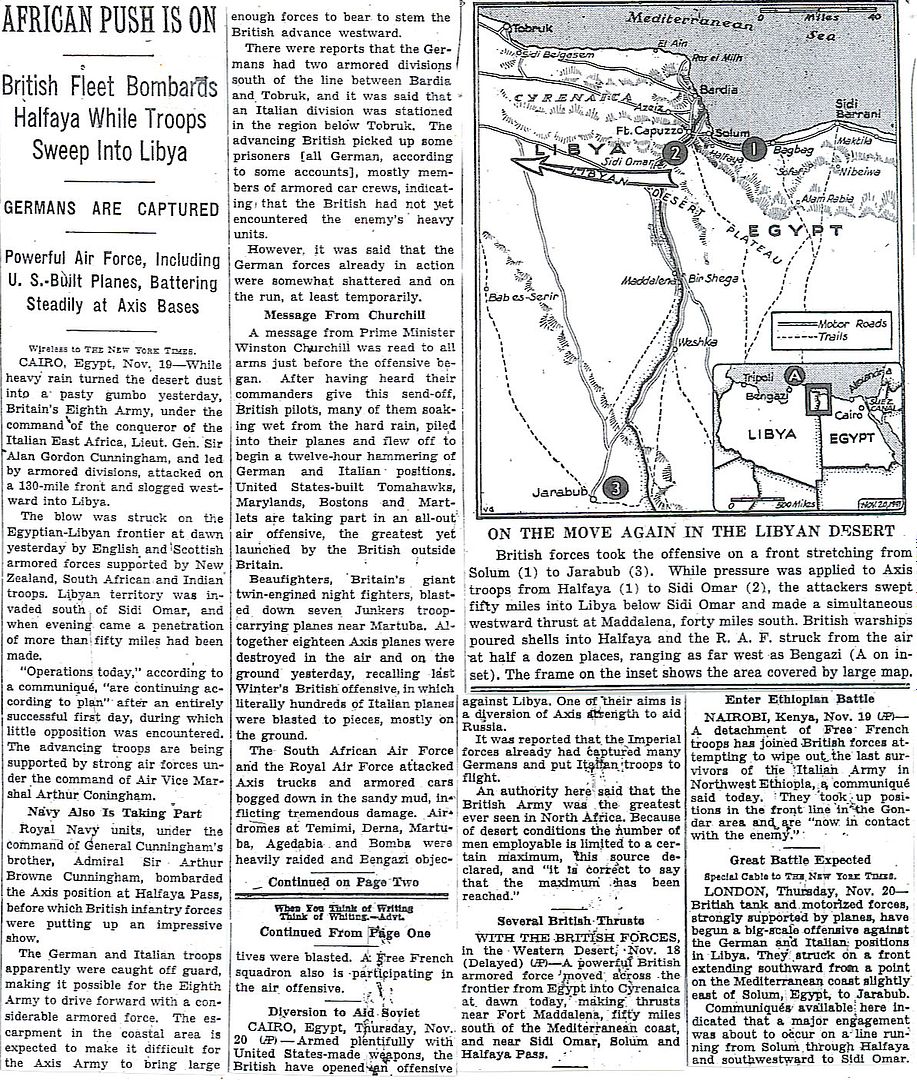
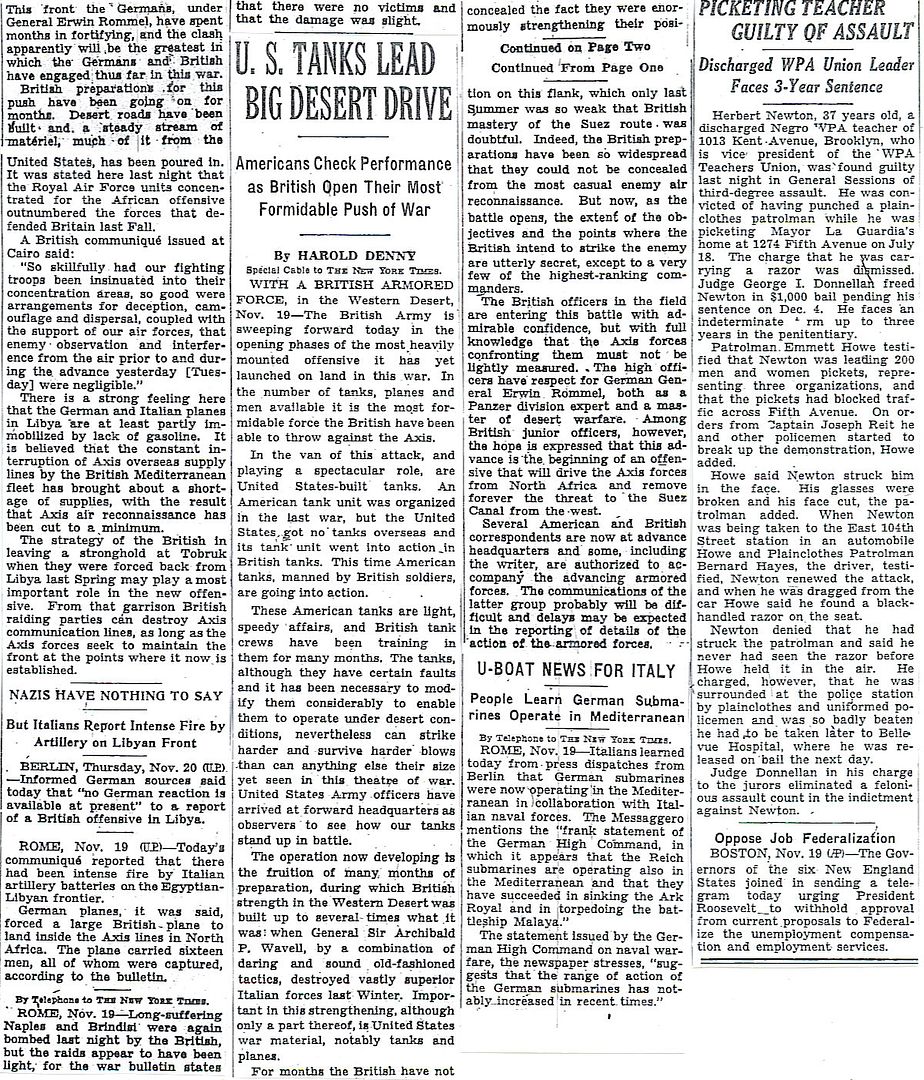
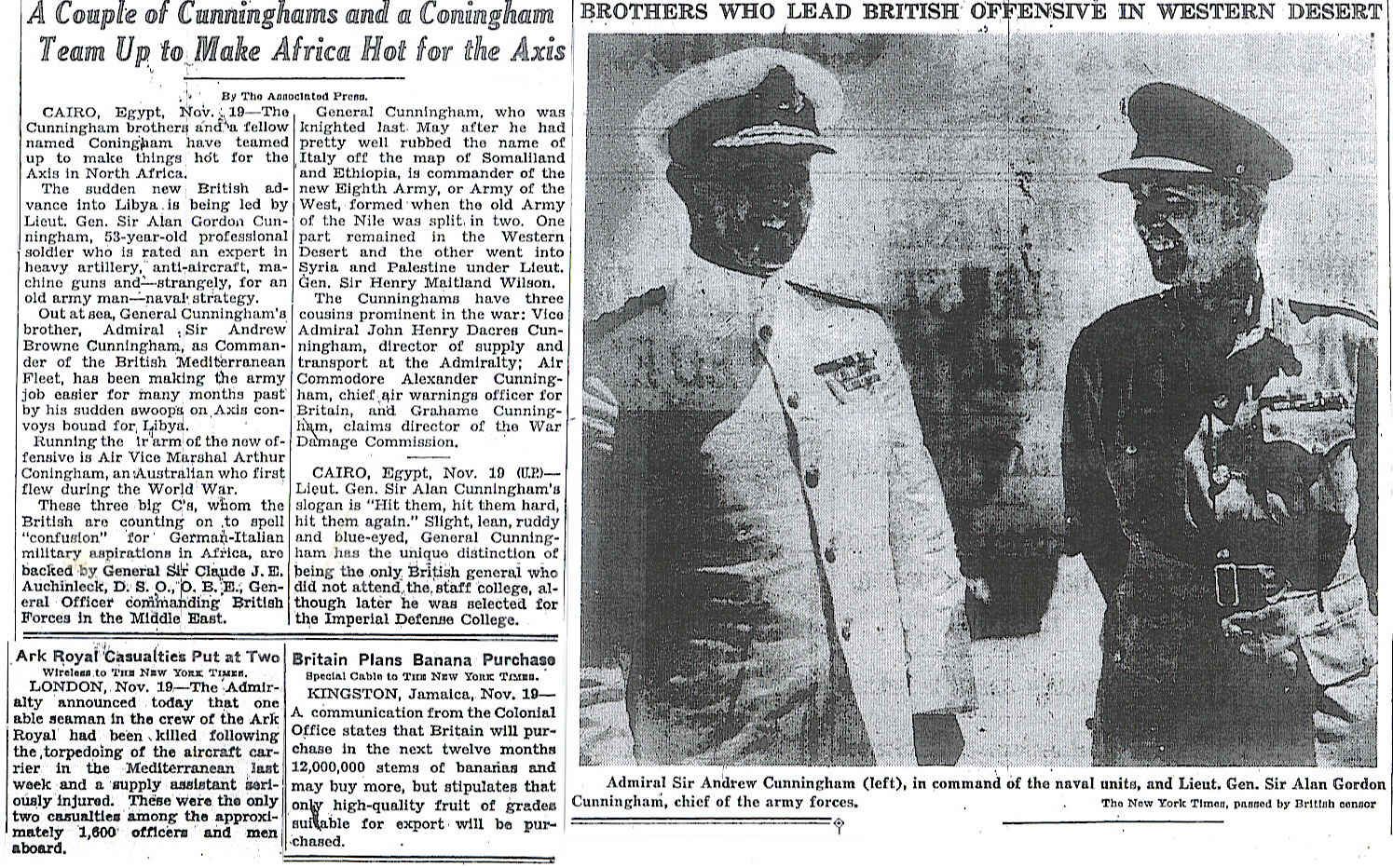
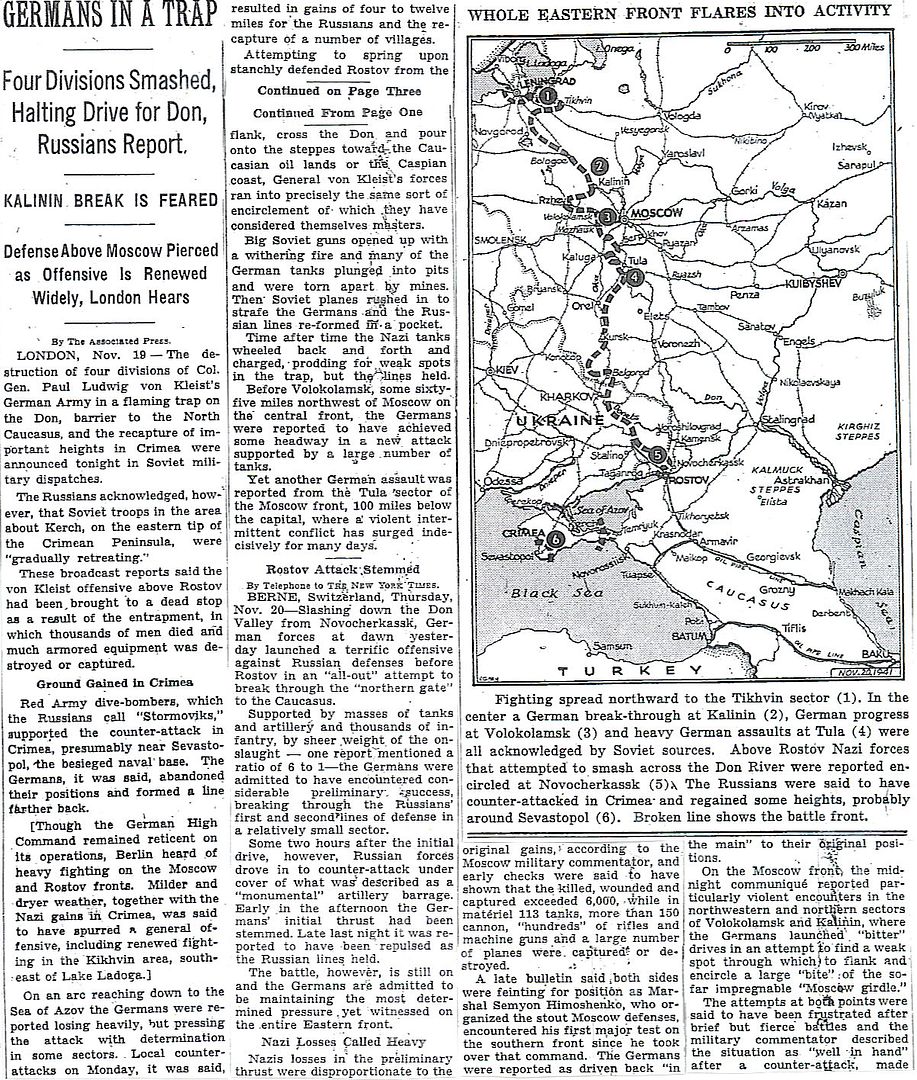
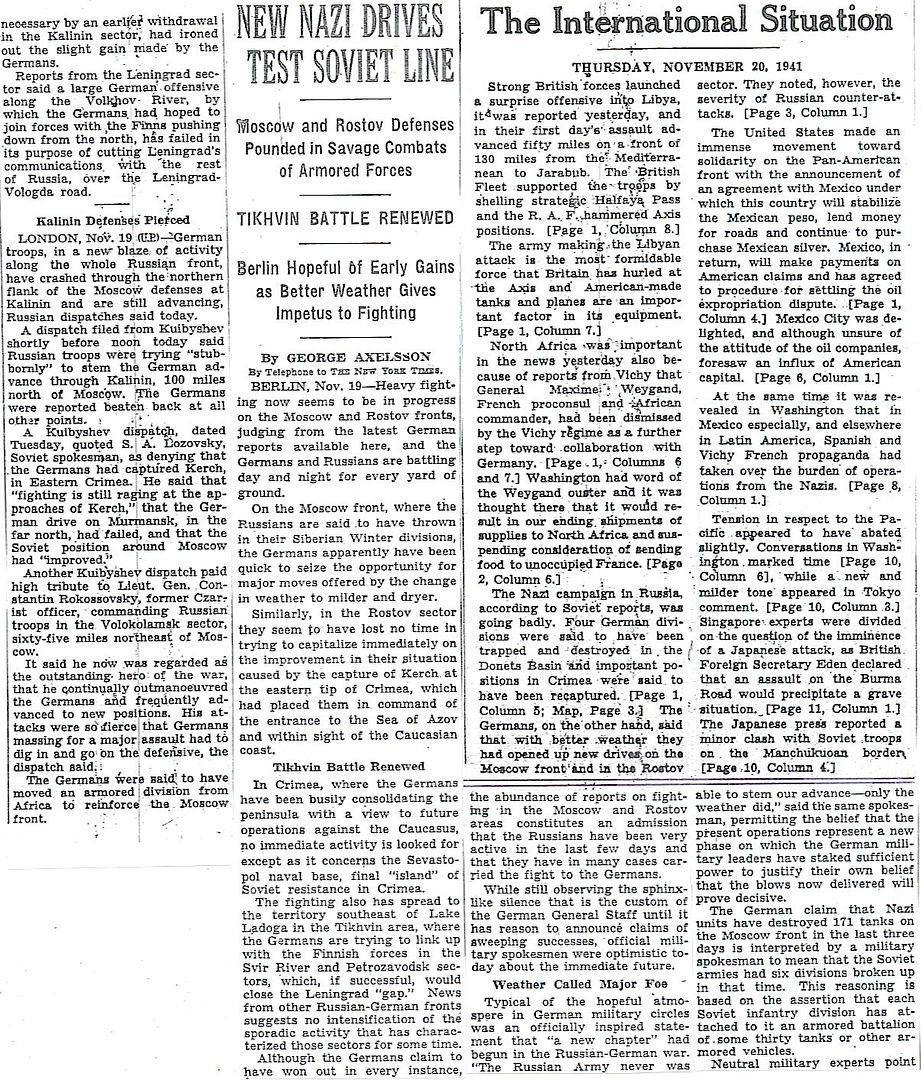
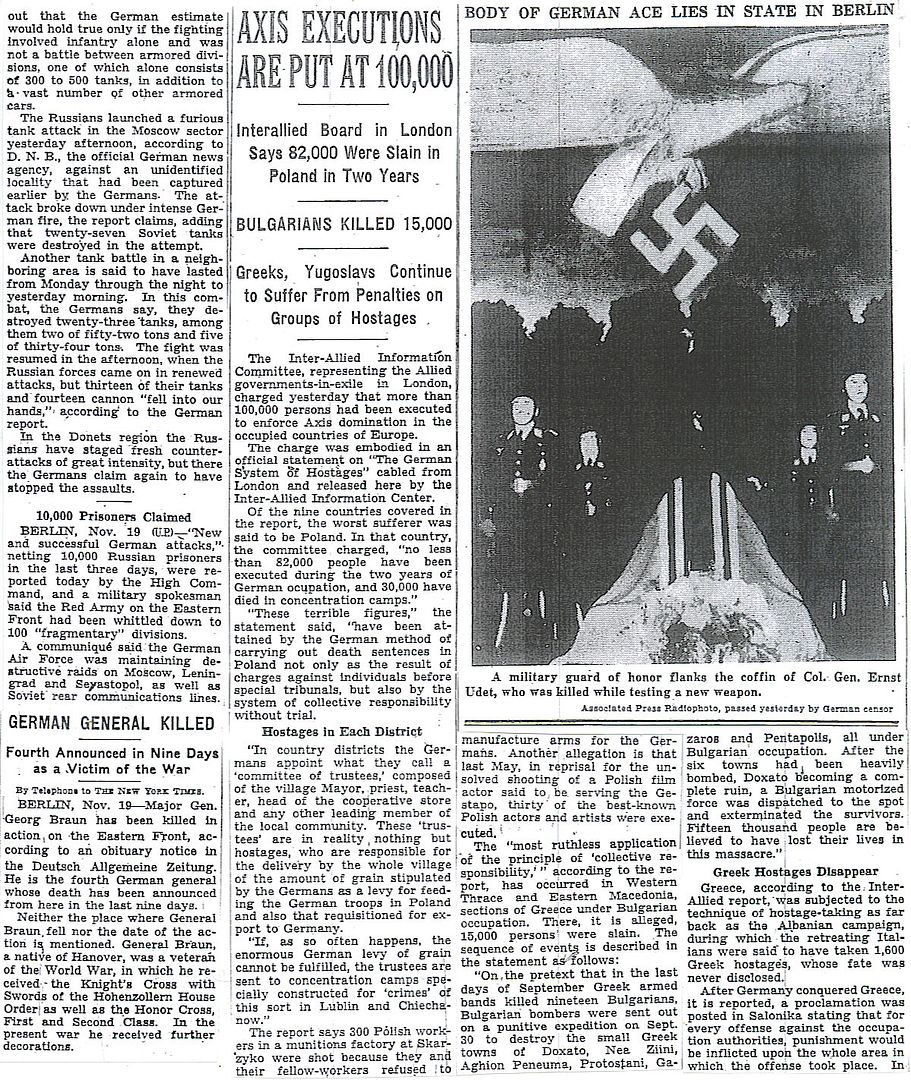
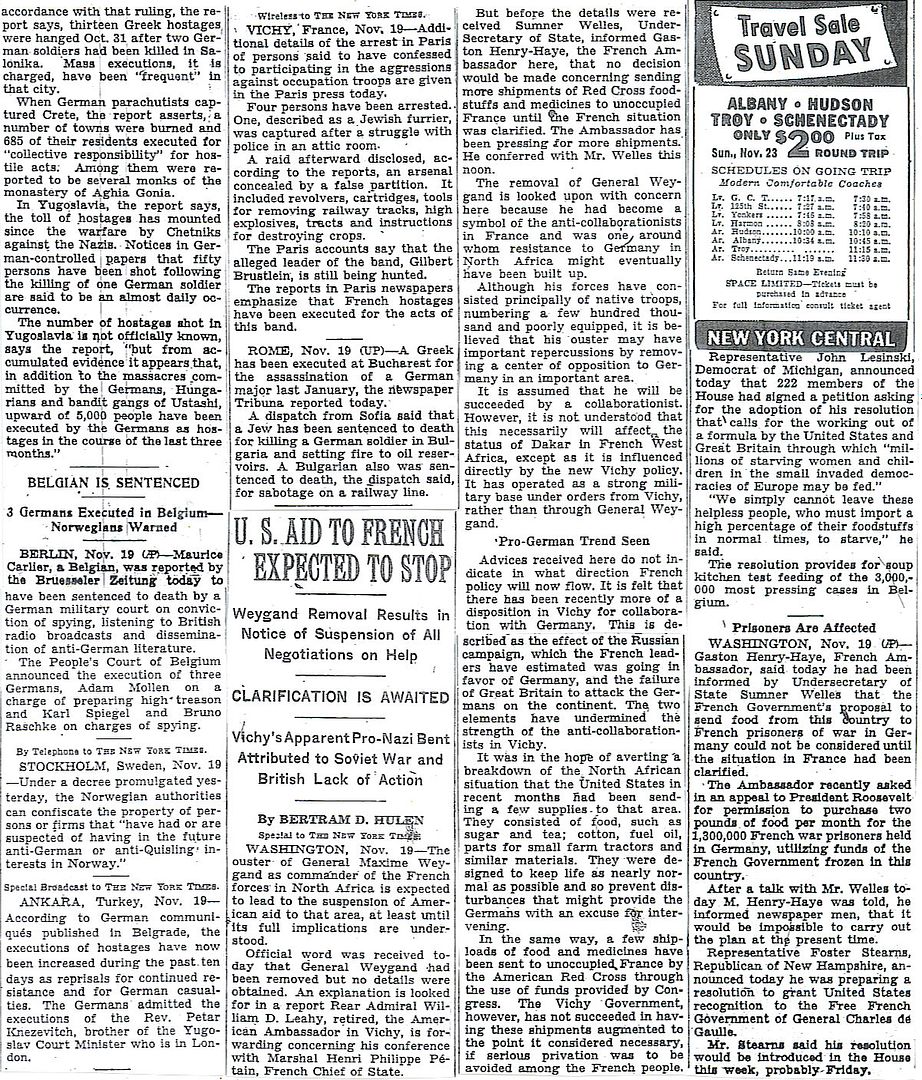
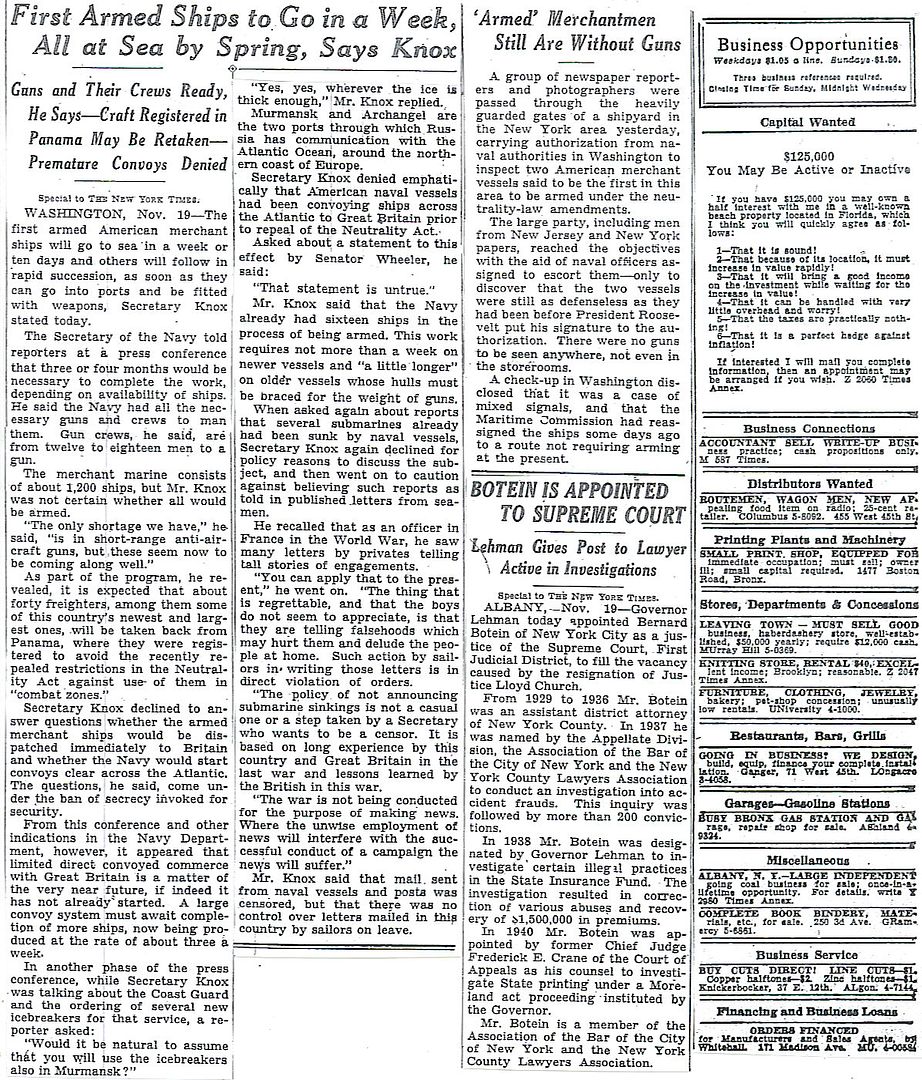
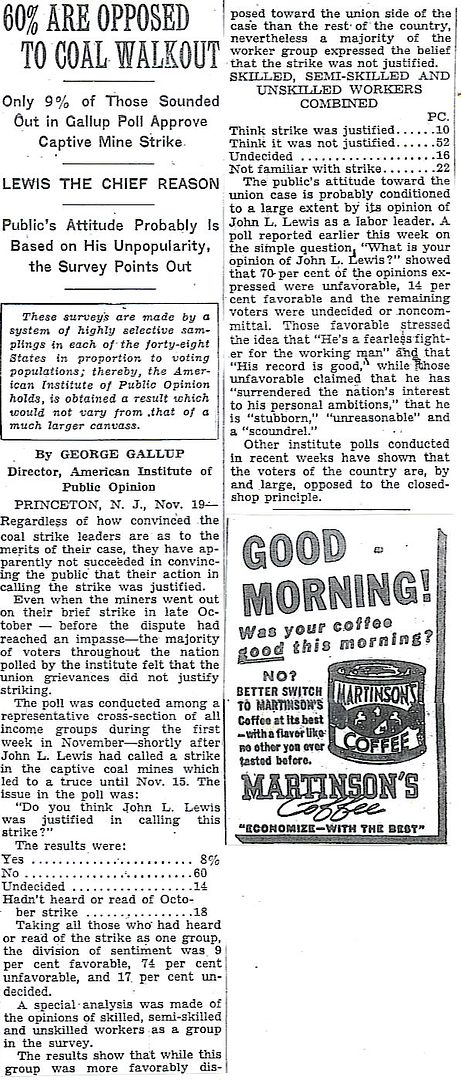
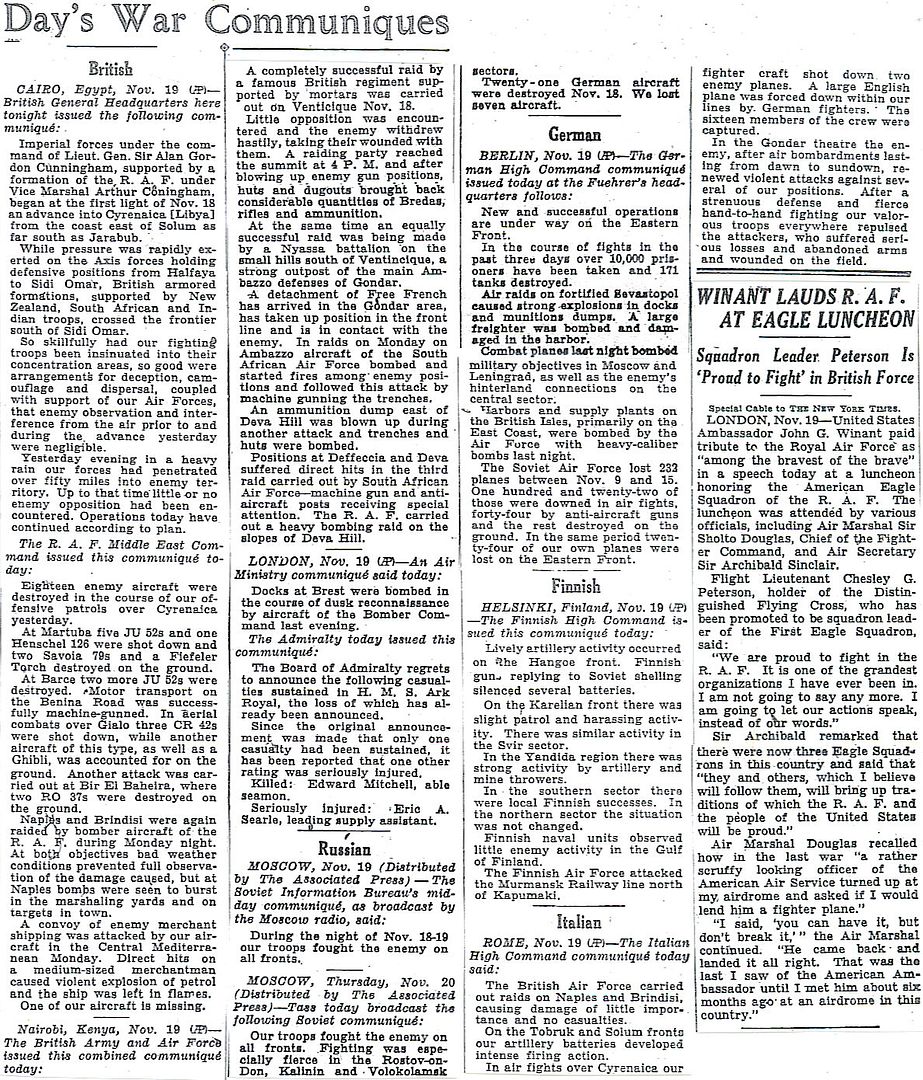
http://www.onwar.com/chrono/1941/nov41/f20nov41.htm
British armor engages German panzers
Thursday, November 20, 1941 www.onwar.com
In North Africa... The British 4th Armoured Brigade engages with German 15th Panzer Division and sustains heavy losses. The British 7th Armoured Brigade is still advancing around Sidi Rezegh and the 22nd Armoured Brigade is moving to join up with the 4th Armoured Brigade. British General Cunningham orders the Tobruk garrison to begin breakout attacks. Rommel orders his panzer divisions toward Sidi Rezegh.
In Vichy (France)... The Vichy Government announces the retirement of General Weygand from his responsibilities in North Africa in response to pressures by German authorities.
From Japan... The Japanese government offer proposals for a interim settlement with the United States. American Secretary Hull rejects the proposals, but prepares a reply which will enable negotiations to continue. This response is not sent after Dutch and British authorities express concerns over the concessions offered to the Japanese in China. The British and Dutch are seen to be acting on concerns expressed by Chiang Kai-shek’s government in China.
http://homepage.ntlworld.com/andrew.etherington/month/thismonth/20.htm
November 20th, 1941
UNITED KINGDOM: Light cruiser HMCS Ontario (ex-HMS Minotaur) laid down.
Corvette HMS Bellwort commissioned.
Minesweeper HMS Rye commissioned.
ASW trawler HMS Bredon launched.
Corvette HMS Poppy launched.
Aircraft carrier HMS Unicorn launched.
Frigate HMS Rother launched.
(Dave Shirlaw)
FRANCE: General Maxime Weygand, Governor-General of Algeria, is removed from his post in North Africa by the Vichy government due to German pressure.
GERMANY: U-597 commissioned. (Dave Shirlaw)
U.S.S.R.: General der Infanterie von Briesen LII Armeekorps is killed at Andrejkawa. (138)(Russ Folsom)
LIBYA: The British operation Crusader continues. The British 4th Armoured Brigade again loses heavily. British General Cunningham orders the Tobruk garrison to begin their planned breakout attacks. Rommel begins to understand the extent of the British attack and issues orders concentrating his forces at Sidi Rezegh.
No. 80 Squadron RAF begin using Hawker Hurricane fighter-bombers, the Hurribomber, in the Western Desert. (22)
General Weygand is removed from his post in North Africa by the Vichy government due to German pressure.
JAPAN: Tokyo: Japan makes a proposal (Plan B) to the USA.
Foreign Minister TOGO Shigenori sends a message to the Japanese ambassador in Ankara, Turkey, that includes the following: “Insofar as Japanese-American negotiations are concerned, in proceeding upon these negotiations for the adjustment of diplomatic relations on a just basis, conferences have been in progress since the 7th. However, there is great disparity between their opinions and our own. In the light of the trend of past negotiations there is considerable doubt as to whether a settlement of the negotiations will be reached. Insofar as we are concerned we have lent our maximum efforts in order to bring about a settlement of the negotiations. However, the situation not permitting any further conciliation by us, an optimistic view for the future is not permitted. In the event that negotiations are broken off, we expect that the situation in which Japan will find herself will be extremely critical. The above is for your information alone.” (Jack McKillop)
All communications are cut to Etorofu Island, Kurile Islands. Tankan Bay is the assembly point for the Japanese naval vessels that will attack Pearl Harbor, Territory of Hawaii. (Jack McKillop)
COMMONWEALTH OF THE PHILIPPINES: Transport, President Coolidge arrived with elements of the 27th BG (L) and the 35th PG. Navy Department disapproved Hart’s proposal to keep the Asiatic Fleet in the Philippines but refuses to provide him with further guidance. Hart protests directly to Stark but no response was made. (Marc Small)
The 5th Air Base Group also arrive in Manila. This group has been sent to the Philippines to support the 7th Bombardment Group (Heavy), the second B-17 group ordered to the Philippines. (Jack McKillop)
Admiral Thomas C. Hart, commander of the Asiatic Fleet, orders the destroyer tender USS Black Hawk (AD-9) and the destroyers USS Alden (DD-211), Edsall (DD-219), John D. Edwards (DD-216) and Whipple (DD-217) dispatched to Balikpapan, Borneo, the Netherlands East Indies. (Marc Small)
PACIFIC OCEAN: Hart ordered tender Blackhawk and four destroyers dispatched to Balikpapan in the Netherlands East Indies.
U.S.A.: The motion picture They Died With Their Boots On opens at the Strand Theater in New York City. Directed by Raoul Walsh, this western drama about General Custer and Little Bighorn stars Errol Flynn, Olivia de Havilland, Arthur Kennedy, Gene Lockhart, Anthony Quinn, Sydney Greenstreet, Regis Toomey and Hattie McDaniel. Appearing on stage is Woody Herman And His Orchestra. (Jack McKillop)
The spectre of a coming war hangs over America, but even as they listen to the latest news from the Atlantic, Britain, Germany and the Russian front and await the arrival on the west coast of Japan’s special envoy, US citizens are buying their Thanksgiving Day turkeys and shopping early for Christmas. Holiday trade will be up 5 to 15% over last year. But not all the economic news is rosy. Congress and the president are preparing anti-inflationary tax legislation, and Roosevelt is threatening a government takeover of the coal mines.
The president, in announcing that he will delay his planned trip to Georgia, blames the coalminers’ strike, but insiders say that he wants to hear what Japan’s special envoy, Saburo Kurusu, has to offer. There is not much optimism, given the tenor of recent statements by Japan’s leaders in Tokyo.
President Roosevelt did get the Neutrality Act amended and he is hearing less and less from “America Firsters”. One restaurant in New York removed a flag belonging to Charles A Lindbergh until, the owner states, “he comes to his senses.”
The Japanese Ambassador to the U.S., NOMURA Kichisaburo presents the following draft proposal to U.S. Secretary of State Cordell Hull: “(1) Both the Governments of Japan and the United States undertake not to make any armed advancement into any of the regions in the South-eastern Asia and the Southern Pacific area excepting the part of French Indo-China where the Japanese troops are stationed at present. (2) The Japanese Government undertakes to withdraw its troops now stationed in French Indo-China upon either the restoration of peace between Japan and China or the establishment of an equitable peace in the Pacific area. In the meantime the Government of Japan declares that it is prepared to remove its troops now stationed in the southern part of French Indo-China to the northern part of the said territory upon the conclusion of the present arrangement which shall later be embodied in the final agreement. (3) The Government of Japan and the United States shall
cooperate with a view to securing the acquisition of those goods and commodities which the two countries need in Netherlands East Indies. (4) The Governments of Japan and the United States mutually undertake to restore their commercial relations to those prevailing prior to the freezing of the assets. The Government of the United States shall supply Japan a required quantity of oil. (5) The Government of the United States undertakes to refrain from such measures and actions as will be prejudicial to the endeavours for the restoration of general peace between Japan and China.”
ATLANTIC OCEAN: USN destroyer USS Nicholson (DD-424), with Task Unit 4.1.5, escorting convoy HX-160 (Halifax, Nova Scotia, Canada, to U.K.), depth charges a sound contact about 195 nautical miles (361 kilometers) north-northeast of St. John’s, Newfoundland, in position 50B030’N, 50B040’W. (Jack McKillop)
We're sending Crowther to the Music Hall to review the new Hitchcock film, but we'll assign one of the initials to the Strand for "Boot On."
made a $100 donation to freeps in name of:
Free Republic University, Department of History presents World War II Plus 70 Years: Seminar and Discussion Forum
You know, I went to the library yesterday and got articles to take us through December 14, 1941. I don't want to give anything away, but in a couple weeks the war news will hit a new level of intensity. As a result, my pile of raw copies for that brief period is discouragingly deep. I came home wondering how I will find the time and energy to prepare it all for posting. But your generous gesture gives me all the motivation I need.
Gimme my scissors and stand back. The paper's about to fly.
December promises to be the greatest month yet in thread history !!
been reading along in “at down we slept”. fascinating. has really changed my view of how the war really started
Part Seven- Typhoon's Last Gasp
Just outside Istra, in a loop of the river, was the foreboding fortress of that town, guarding its western approaches. The "Reich" SS Division succeeded in capturing the citadel by a surprise assault. The "Deutschland" and "Der Fuehrer" SS Infantry Regiments, supported by the "Reich" SS Artillery Regiment, had broken in from the south and infiltrated into its gloomy, barricaded streets. Hitler's and Stalin's guards, as usual, fought another frightful encounter and gave each other no quarter.
The Siberians were eventually forced to withdraw.
Istra, the keypoint of Moscow's last line of defense, thus was taken.
On the morning of 28th November the Waffen SS took Vysokovo and continued its advance towards Moscow. By then the assault units were within a 20-mile radius of the Kremlin.
The thermometer stood at 26 below zero Fahrenheit. The men had to spend the nights in the open. They put on everything they had—but it was not enough. They had no sheepskin jackets, no fur caps, no felt boots, no fur gloves. Their toes froze off. Their fingers in the thin woolen mittens turned white and stiff.
But in spite of all the hardships there were moments of comfort and ease. During the black, eerie, tense nights at the turn of November-December 1941, when the whole land seemed captured in the grip of the merciless frost, and you could actually hear the bark cracking off the trees, when the Junkers planes overhead droned towards Moscow and the skyline was lit up by Soviet anti-aircraft fire, the troops would switch on the German forces programme from Belgrade and listen to Lale Andersen's dark voice singing Lili Marlene. It seems hardly credible, but whoever was in that campaign against Moscow that winter and got away alive always remembered that sentimental, nostalgic song that brought tears of homesickness to the men's eyes.
On 2nd December the spearheads of the "Reich" SS Infantry Division were outside Lenino. Second Lieutenant Weber, the orderly officer of the OC Army Artillery 128, Colonel Weidling, wrote in a letter to his mother in Hamburg:
These Russians seem to have an inexhaustible supply of men. Here they unload fresh troops from Siberia every day; they bring up fresh guns and lay mines all over the place. On the 30th we made our last attack—a hill known to us as Pear Hill, and a village called Lenino. With artillery and mortar support we managed to take all of the hill and half of the village. But at night we had to give it all up again in order to defend ourselves more effectively against the continuous Russian counter-attacks. We only needed another eight miles to get the capital within gun range—but we just could not make it.
Fourth Panzer Group just could not make it any longer.
Its offensive formations advanced only a few more miles. The situation of 10th Panzer Division was typical. The combat group of the combat-hardened 69th Rifle Regiment had reached the village of Lenino on 1st December, supported by the division's last tanks. But they could only seize the western fringe of the village from the Russians. In its eastern part, separated from the Germans by a small stream, the enemy was firmly established, as if concreted into the ground. For four days they lay opposite each other. Russian artillery ceaselessly shelled the German positions. The handful of men of 69th Regiment became fewer and fewer—and they did not gain an inch of ground. This was only 21 miles from the Kremlin, 14 miles from the north-western outskirts of Moscow, and 11 miles from its northern river port.
But other divisions were still worming their way forward through ice and snow towards the capital. South of Istra, to both sides of the Ruza-Zvenigorod road and along the Moskva river, the IX Corps under General Geyer tried its luck with 252nd, 87th, and 78th Infantry Divisions. Their first objective was the Zvenigorod-Istra road and the town of Zvenigorod itself, an arsenal and ammunition dump for the western sector of Moscow's defenses.
The town was situated amid a virgin forest area deep in snow. Inside it, in countless well-camouflaged dugouts and concrete pillboxes, were the regiments of the Soviet Fifth Army. The first obstacle to be taken was Lokotnya. There the 78th Infantry Division from Württemberg got stuck in the mud towards the end of October. Now it intended to thrust past the enemy barrier.
In a bold outflanking movement Colonel Merker led his reinforced 215th Regiment on a "tiptoe advance" secretly along small paths, in single file, through snowbound virgin forest and across exposed clearings into the rear of the Russian positions, over-ran them, and on 20th November captured Lokotnya.
By 24th November the infantry regiments, reinforced by sappers, fought their way right up to Aleksandrovskoye, a veritable fortress, and by noon of 2nd December to the eastern end of Yershovo. By then the division had spent its strength.
It did not succeed in taking Zvenigorod.
Between the 78th Infantry Division's left-hand neighbor, the 87th Infantry Division (DC Infantry Corps), and the "Reich" SS Infantry Division (XL Panzer Corps) the 252nd Infantry Division drove forward and penetrated into the Soviet defenses. Heavy fighting ensued in the pathless forests, and the regiments found themselves in great difficulties. The 461st Infantry Regiment was cut off and had to rely on its own resources for the next two days. Stukas battered the Russians until their resistance was broken. The 7th Infantry Regiment reached Prokovskoye. On 1st December a combat group of 2nd Battalion pushed the fighting line a few miles beyond Prokovskoye against repeated enemy attacks. Beyond that they were unable to advance.
The snow, the cold, exhaustion, and Russian opposition forced a halt.
The Russians proved themselves masters of rapidly improvised defense, especially in the wintry forests and swamps. Four months earlier the forces they employed outside Moscow would very probably have been smashed by the German divisions. But against the overextended, down-at-heel, and half-frozen German spearheads, lacking armor and heavy weapons, the Russians were strong enough. The old adage was proved true once more: it is the last battalion that matters. The best illustration was provided by the fighting for the motor highway.
The motor highway from Smolensk was the shortest, the fastest, and the best route into Moscow.
Where it threaded its way between the Nara Lakes, together with the old postal road, east of the Shelkovka-Dorokhovo crossroads, the Russians had dug in and blocked this most important artery of the German offensive. In vain did 4th Panzer Group, together with General Fahrmbacher's VII Corps, try to break through the barrier running from the Nara Lakes via the motor highway and the postal road to the Moskva bend. The 267th Infantry Division from Hanover, fighting north of the Moskva, was stuck in deep snow and bitter cold. The experienced 197th Infantry Division, known as the "Highway Clearing Division," and the Bavarian 7th Infantry Division tried unsuccessfully, together with the gallant French Legion, to break the enemy's stubborn resistance along the Nara Lakes-motor highway-postal road—Lake Poletskoye—Moskva bend line by bypassing it on the left. But the neck of land at Kubinka remained barred.
In order to gain the modern motor highway to Moscow after all, at a point south-east of Naro-Fominsk, Field-Marshal von Kluge on 1st December mounted a bold operation with XX Infantry Corps of his Fourth Army, at its junction with Fourth Panzer Group. It very nearly came off. Colonel P. A. Zhilin, the official Soviet military writer, reports in his book The Most Important Operations of the Great Fatherland War:
At the beginning of December the enemy made his last attempt at breaking through to the capital from the West. For this purpose the tanks and the motorized and infantry divisions of his Fourth Army were concentrated in the Naro-Forminsk area. The enemy succeeded in penetrating deep into our defensive positions.
That was exactly what happened. Kluge intended to gain the motor highway behind the Nara Lakes by means of a sweeping encircling movement, and then to cover its flank. Towards 0500 hours on 1st December the XX Corps under General Materna mounted its attack against the motor highway east of Naro-Fominsk with 3rd Motorized Infantry Division, 103rd, 258th, and the reinforced 292nd Infantry Divisions—the main effort being with 258th Infantry Division, which already held the bridge over the Nara at Tashirovo. In sub-zero weather the extensive field fortifications southeast and north of the town were pierced. The 292nd Infantry Division, reinforced by units of 27th Panzer Regiment, 19th Panzer Division, wheeled to the north. Colonel Hahne gained Akulovo with his headquarters troops and 2nd Battalion, 507th Infantry Regiment; this village was only four miles from the motor highway and 35 miles from Moscow.
On the right wing of XX Corps Corps the 183rd Infantry Division fought its way right up to the motor highway west of Shalamovo with two battalions of 330th Infantry Regiment on 2nd December, and dug in for all-round defense. On the morning of 3rd December 330th Infantry Regiment, without being pressed by the enemy, was ordered to withdraw to its starting positions on the Nara, south of Naro-Fominsk.
The 3rd Motorized Infantry Division and 258th Infantry Division launched an outflanking attack against Naro-Fominsk. The temperature was 34 degrees below zero Centigrade, and there was an icy wind which made the troops' bones ache. The first instances occurred of men throwing themselves down in the snow, crying, "I can't go on." The battalions shrank more and more—through frost injuries rather than enemy action. Some battalions were down to eighty men.
In the Brandenburg 3rd Motorized Infantry Division the 1st Battalion, 29th Infantry Regiment, lost all its company commanders during the first few days of fighting. The 5th Company, which started this final offensive with seventy men, had only twenty-eight men left by the first evening. The company commander was wounded, the two sergeants had been killed, and of the other nine NCOs four had been killed and three wounded. Nevertheless the 29th Infantry Regiment took Naro-Fominsk and drove another three miles to the east along the highway. But then the attack ground to a standstill at 38 degrees below zero Centigrade.
The only progress made towards the east was on the division's left, in the area of 258th Infantry Division. There a mobile combat group under the command of Anti-aircraft Battalion 611, operating on the division's left wing, punched its way through to the north-east, via Barkhatovo and Kutmevo, to Podazinskiy. Indeed, the "advanced detachment Bracht," with Motorized Reconnaissance Battalion 53, 1st Company, Panzerjâger Battalion 258, two platoons of 1st Company Antiaircraft Battalion 611, and a few self-propelled guns, succeeded in getting as far as Yushkovo, to the left of the highway. From there it was only 27 miles to the Kremlin.
On the other side of the road was the village of Burzevo. This miserable place with its thirty thatched houses on the far side of a snow-covered drill square was the target of the spearheads of 258th Infantry Division. In the late afternoon of 2nd December the 3rd Battalion, 478th Infantry Regiment, likewise penetrated into the village of Burzevo along the Naro-Fominsk to Moscow road. Units of 2nd Battalion had been holding their ground desperately for several hours against enemy attacks. The twenty-five or thirty straw-covered houses of the little village exercised a mesmeric attraction on the troops. The smoke rising straight into the icy sky from their chimneys promised hot stoves.
There was nothing the men longed for more than a little warmth. They had spent the previous night in the old concrete pillboxes of a tank training ground west of the village, and had been caught there by a sudden drop of temperature to 35 degrees below zero Centigrade.
The collective farmers had been using those pillboxes as chickenhouses. The chickens had gone, but the fleas stayed behind. It was an appalling night.
The only way to escape from the fleas was to cower behind the chunks of concrete. And there the frost was lurking. Before the men realized it their fingers had turned white and their toes were frozen into insensitivity inside their boots. In the morning thirty men reported at the medical post, some of them with serious frostbite. But there was no point even in taking the boots off—the skin would merely be left behind frozen to the insoles together with the rags they had wrapped their feet in. There were no medical supplies for the treatment of frostbite. Nor was there any transport to take the casualties to the main dressing station. Thus the frost-bitten men remained with their units and longed for the warm houses of Burzevo.
The battalion had launched its attack at dawn, without artillery preparation. They were supported by three self-propelled guns and one 8.8-cm. anti-aircraft gun. The Russians in their positions outside and in Burzevo were clearly also suffering from the cold. They were equally badly supplied with winter clothing as the German troops, and seemed unwilling to engage in any major fighting. The Russian wounded and those who surrendered were patently under the influence of vodka. They maintained that behind them there were no further defenses this side of Moscow, except for a few antiaircraft positions. At two points only did the Russians try to set fire to the village. The terrible meaning of Stalin's scorched-earth order was first made apparent.
Major Staedtke reduced sentries and pickets to the bare minimum and allowed the rest of his men to go into the houses with their warm stoves. There they sat, crouched, or lay, crowded together like sardines with the Russian civilian population. They piled bricks into the stoves. And every hour, as a few men went out to relieve the sentries, they would take a brick with them—but not to warm their feet or hands. The heat had to be saved for something more important. The hot bricks were wrapped in rags and placed on the locks of the machine-guns to prevent the oil from freezing. If a Russian suddenly emerged behind a snow hummock, where he might have lain for hours, the sentries could not afford a jammed gun. Thus they carted their hot bricks and stones outside every hour to keep their weapons warm. Those who had been relieved and came inside felt as though they were entering paradise.
But paradise was short-lived—six hours in all. The OC 258th Infantry Division withdrew the reinforced 478th Infantry Regiment to Yushkovo; the 3rd Battalion covered the movement as the rearguard. At 2200 hours the Russians made another attack with T-34s. They knew what they wanted. Systematically they fired at the straw roofs to set the houses on fire. Then they broke into the village. Fighting continued in the light of the burning farmhouses. The 8.8-cm. gun finished off two Soviet tanks, but then received a direct hit itself. Self-propelled guns and T-34s chased each other around the blazing houses. The infantry lay in the gardens, behind baking ovens, and in storage cellars. Second Lieutenant Bossert, with an assault detachment of 9th Company, tackled the T-34s with old Russian anti-tank mines.
Half a dozen of the blotchy monsters were lying motionless in the village street, smoldering. But two of the three German self-propelled guns were also out of action. One of them stood in flames just outside the garden where Dr Sievers, of the Medical Corps, had organized his regimental dressing station in a potato store cellar. Pingel, his medical NCO, was ceaselessly injecting morphia or SEE—a combination of Scopolamin, Eukodal, and Ephetonin—in order to relieve the pain of the wounded. He carried his equipment in his trouser pocket because otherwise the ampoules would freeze up. Of course, it was not sterile—but what was the point of asepsis in those conditions? The main thing was to help the wounded lying on the ground in such weather.
When the day dawned the 23rd Battalion was still hanging on to the ruins of Yushkovo. Six T-34s lay in the village, gutted or shot up. The Russian infantry did not come again. The attack had been repulsed. But it was also clear that there could be no question of a further advance towards Moscow. The men were finished.
Seventy seriously wounded were lying in the icy potato cellars. The order came through to abandon Yushkovo and to withdraw again behind the Nara. It was the hour when the whole of Fourth Army suspended its offensive and recalled its spearheads to the starting-lines.
Dr Sievers ordered the wounded to be loaded on the horse-drawn carts which had arrived in the line at night with ammunition and food supplies. But there was not enough room for them. The shattered vehicles were likewise loaded with wounded and hitched like sledges to the tractor of the 8.8-cm. gun. The most serious cases were placed on the self propelled guns. The dead had to be left behind, unburied. It was almost a Napoleonic retreat.
The columns had no sooner left the village than the Russians began shelling them. Hits were scored among the columns.
The horses drawing two carts of wounded fell. The carts overturned. The wounded cried out desperately for help. Suddenly the silhouettes of Soviet tanks appeared on the edge of the wood in front.
"Russian tanks!" There was panic.
Escape was the only thought. For the first time Dr Sievers drew his pistol. "Pingel, Bockholt, over here!"
The three men—the doctor and the two medical NCOs—positioned themselves across the road, their pistols drawn. The gesture was enough. Abruptly, reason once more prevailed. The wounded were loaded on the carts again. Twelve men harnessed themselves to each of the carts. Pingel led one of them and Bockholt the other. At a trot they made for the patch of wood where the last self-propelled gun had gone into position and where the horsedrawn columns were waiting for them. On 4th December they were back behind the Nara river.
On 5th December the assault formations of Third Panzer Army and Fourth Panzer Group on the left wing of Army Group Centre were engaged in heavy offensive fighting along a wide arc north and north-west of Moscow. On the Moskva-Volga Canal, just over 40 miles north of the Kremlin, the 7th Panzer Division held its barrier position west of Yakhroma. About 25 miles farther south the combat group Westhoven of 1st Panzer Division, operating in conjunction with units of 23rd Infantry Division, was attacking via Belyy Rast towards the south-east and east in the direction of the canal crossing north of Lobnya. The Motorcycle Battalion, reinforced by tanks and artillery, took Kusayevo, a little over a mile west of the canal and about 20 miles north of the Kremlin, in the late afternoon. At Gorki, Katyushki, and Krasnaya Polyana —at their most easterly point still about 10 miles from Moscow—the troops of the Viennese 2nd Panzer Division were engaged in bitter fighting. The same kind of heavy defensive fighting was also going on in the neighboring sectors, with XLVI Panzer Corps and XL Panzer Corps, as well as IX and VII Infantry Corps of Fourth Panzer Group.
At Katyushki—one of the most south-easterly advanced strongpoints of 2nd Panzer Division—units of the 2nd Rifle Brigade, the reinforced 1st Battalion, 304th Rifle Regiment, under Major Buck, were engaged in fierce fighting. Katyushki was so near Moscow that through his trench telescope in the loft of the farmhouse by the churchyard Major Buck was able to watch the life in the streets of the city. It all seemed within arm's reach; But their reach was too short. Their strength was insufficient.
On 4th December a few more winter coats arrived and a few pairs of long, thick woolen stockings. Over the radio, simultaneously, came the announcement: "Attention, frost warning. Temperatures will drop to 35 degrees below zero Centigrade." By no means yet had all the men of 1st Battalion been issued with overcoats. There were also many days when they scarcely got a mouthful of hot food. But even that was not the worst. The worst was the shortage of weapons and ammunition. The Panzerjâgers had only two 5-cm. anti-tank guns left per troop, and the artillery regiment was down to one third of its guns. With this kind of equipment they were expected to capture Moscow In 30 to 40 degrees below zero Centigrade.
What the men in the open went through during those days, with their machine-guns or anti-tank guns, cowering in their snow-holes, borders on the fantastic. They cried with cold. And they cried with fury and helplessness: they cried because they were within a stone's throw of their objective and yet unable to reach it. During the night of 5th/6th December the most advanced divisions received orders to suspend offensive operations. The 2nd Panzer Division was then 10 miles north-west of Moscow.
At much the same time, during the night of 5th/6th December, Colonel-General Guderian likewise decided to break off the attack on Tula on the southern flank of Army Group Centre, and to take back his far-advanced units to a general defensive line from the Upper Don via Shat to Upa. It was the first time in the war that Guderian had to retreat.
It was an ill omen.
To begin with, the new offensive had gone well on his sector. The Second Panzer Army had gone into action with twelve divisions and the reinforced "Grossdeutschland" Infantry Regiment. But the strength of 12 1/2 divisions was only a figure on paper: in terms of fighting strength it amounted to no more than four. On 18th November Second Lieutenant Stôrck of the 3rd Panzer Division again pulled off a masterly stroke with the Engineers platoon of Headquarters Company, 394th Rifle Regiment. South-east of Tula he seized the railway bridge over the Upa in a surprise coup. This time Stôrck, the bridge specialist, had thought up a very special trick. The main fighting line ran four miles from the bridge. Four miles of flat, frozen ground with no cover for creeping up to the bridge and taking it by surprise. However, Stôrck realized that the Russians, just as the Germans, clung to the villages at night because of the cold, and he therefore believed that it might be possible in the dark to filter through a thin enemy picket-line.
The plan was put into effect. An assault party of altogether nineteen men with three machine-guns, relying only on their compass, moved softly forward through the black night and the Russian lines. When dawn broke they were 500 yards from the bridge. Then came the second part of the plan.
Störck, Sergeant Strucken, and Lance-corporal Beyle took off their battle equipment and dressed themselves up as German prisoners.
Pistols and hand-grenades were stowed away in their overcoat pockets. Two Ukrainians, Vassil and Yakov, who had been with the sapper platoon for the past two months, shouldered their rifles. In their Russian greatcoats and forage caps they looked absolutely genuine. Talking Russian in loud voices, they led their three 'prisoners' towards the bridge while Sergeant Heyeres and his men were waiting under cover.
The first Soviet bridge guard of four men were asleep in two foxholes. The action took only a few seconds, and there was no sound.
Now the five were heading for the 80-yard-long bridge. Their footsteps rang on the hard ground. Vassil and Yakov, talking at the top of their voices, acted their part magnificently. They had nearly got to the bridge when a shadow detached itself from it. A sentry was coming towards them.
"Just the man we want," Vassil said loudly.
"We are from the next sector, but perhaps you can take these fascists off our hands."
It was all over before the Russian suspected anything. But the second sentry at the end of the bridge was watching intently.
And as they came nearer he challenged them, became suspicious, jumped down the bank under cover, and raised the alarm.
Too late.
Störck fired two white Very lights. Sergeant Heyeres was already on top of the bridge with his machine-gun and fired for all he was worth. Beyle and Strucken flung their hand-grenades against the dugouts of the bridge guard. The Soviets came staggering out, still dazed with sleep, and raised their hands: 87 prisoners, five machine-guns, two heavy anti-tank guns, three mortars, and an intact assault bridge were the bag made by the handful of German troops.
Their cunning and courage had gained the equivalent of a victorious battle.
On 24th November Guderian's 3rd and 4th Panzer Divisions and the "Grossdeutschland" Regiment had encircled Tula from the south-east against stubborn resistance by Siberian rifle divisions. The advanced detachments of 17th Panzer Division were approaching the town of Kashira. Just then Lieutenant-Général I. V. Boldin threw his Soviet Fiftieth Army into battle against Guderian's weakened forces. Pressure against the thin and extended German front line became dangerous, since Guderian's adage "We tankmen are in the fortunate position of always having exposed flanks" applied to Blitzkrieg but not to positional warfare.
In a letter to his wife Guderian wrote with bitterness and pessimism:
The icy cold, the wretched accommodation, the insufficient clothing, the heavy losses of men and materiel, and the meager supplies of fuel are making military operations a torture, and I am getting increasingly depressed by the enormous weight of responsibility which, in spite of all fine words, no-one can take off my shoulders.
Nevertheless the 167th Infantry Division and the 29th Motorized Infantry Division on 26th November surrounded a Siberian combat group in the Danskoy area, beyond the Upper Don. Some 4000 prisoners were taken, but the bulk of the Siberian 239th Rifle Division succeeded in breaking out.
The encircling forces—in the north the 33rd Rifle Regiment, 4th Panzer Division, in the south and west units of LIII Corps with 112th and 167th Infantry Divisions, in the east units of 29th Motorized Infantry Division—were simply too weak numerically.
Magnificently equipped, with padded white camouflage overalls and even their weapons whitewashed, the Siberians again and again attacked the weak encircling forces in night raids, wiped out whoever opposed them, and fought their way out towards the east between the 2nd Battalion, 71st Motorized Infantry Regiment, and the 1st Battalion, 15th Motorized Infantry Regiment. The German formations were no longer strong enough to prevent a breakout. The battalions of 15th and 71st Infantry Regiments suffered exceedingly heavy losses. Thus, in spite of all efforts, it proved impossible to capture the surrounded town of Tula —"little Moscow," as it was called—or to drive beyond Kashira, let alone to reach the distant objective of Nizhniy Novgorod, now Gorky. True enough, on 27th November the 131st Infantry Division in an easterly push succeeded in taking Aleksin. Likewise, the 3rd and 4th Panzer Divisions succeeded on 2nd December in advancing as far as the Tula-Moscow railway-line and blowing it up. Indeed, on 3rd December the 4th Panzer Division succeeded in reaching the Tula-Serpukhov road at Kostrova. The XLIII Corps thereupon tried once more to link up with the 4th Panzer Division to the north of Tula, and to throw the enemy back to the north. On 3rd December the most forward units of the Corps—the 82nd Infantry Regiment, 31st Infantry Division —got within nine miles of the 4th Panzer Division, but they could not realize their aim. On 6th December the offensive had to be suspended on this sector too. The troops and their vehicles stuck fast in a truly Arctic frost of 30 degrees, and in places 45 degrees, below zero Centigrade.
Desperate, Guderian sat over his maps and reports at his darkly lit headquarters nine miles south of Tula, in a small manor house famous throughout the world—Yasnaya Polyana, Tolstoy's estate.
In the grounds outside, overgrown with ivy and now deep in snow, was the grave of the great writer. Guderian had allowed the Tolstoy family to keep the rooms in the big house and had moved with his staff into the museum; even there two rooms were set aside for the exhibits and sealed up.
There, in Tolstoy's country house during the night of 5th/ 6th December, Guderian decided to recall the advanced units of his Panzer Army and go over to the defensive. He was forced to admit:
"The attack against Moscow has failed. We have suffered a defeat."
Next: "The Siberians Are Coming!"
Hitler Moves East by Paul Carell
Moscow 1941-Hitler's First Defeat by Robert Forczyk
Great reading...so is this excerpted from “Hitler moves east”? I’m unsure exactly what publication this is from. Thaks for posting, I’ve never read this much detail on Typhoon.
"Approximately 7000 Jews from Minsk, Belorussia, are killed at nearby Tuchinka."
"A band of Jewish partisans marches in a forest in Yugoslavia.
Partisans often liked to be pictured with their weapons to portray their strength and determination.
They needed every ounce of both, given the rugged nature of Yugoslavia's terrain and the obvious advantages of the Nazis."
Disclaimer: Opinions posted on Free Republic are those of the individual posters and do not necessarily represent the opinion of Free Republic or its management. All materials posted herein are protected by copyright law and the exemption for fair use of copyrighted works.